Choosing the right door can be confusing. The wrong choice wastes space and ruins a room’s flow. Making a bad decision impacts the final design and daily use.
The key difference is their movement. Hanging doors, or hinged doors, swing open and take up floor space. Sliding doors glide on a track, saving space. This makes sliding doors ideal for modern, smaller rooms where you want to create an open feel.
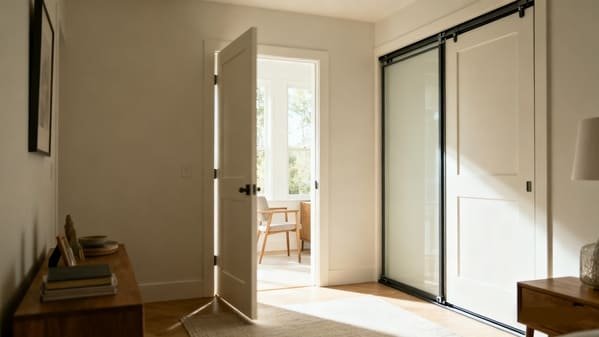
So, we have the basic difference: one swings, one slides. But that’s just the beginning. When a professional buyer like Jacky from Canada calls me, he doesn’t just ask about the basics. He wants to know the practical details for his projects—which one performs better, what are the hidden costs, and which is truly the right choice for a specific application. Let’s dive into the questions he and many others ask me all the time.
Are sliding doors better than hinged doors?
Picking the "better" door feels like a huge decision for any project. A wrong choice can lead to unhappy clients, design problems, or just a room that feels wrong.
Neither is universally "better." Sliding doors are superior for saving space and creating a modern, open aesthetic. Hinged doors are often better for insulation, security, and creating traditional, private rooms. The best option depends entirely on the project’s unique requirements.
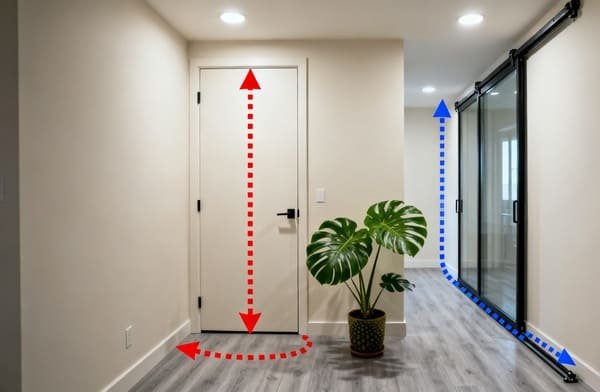
When I’m talking to a client, I always frame this question around their goals. It’s not about which door type wins; it’s about which door solves their problem most effectively. Let’s break down the key differences to help you decide.
Functionality vs. Aesthetics
Sliding doors1 are brilliant for merging two spaces. Think of a living room that opens onto a patio. A large glass sliding door makes it feel like one big area. Hinged doors2, on the other hand, are better at defining spaces. They close firmly, creating a clear boundary. This is why they are standard for bedrooms and bathrooms, where privacy is essential. The aesthetic is also completely different. Sliding doors1 feel sleek and minimalist. Hinged doors2 are traditional and can be customized to fit almost any classic design style.
Key Considerations
Here’s a simple table I often share with buyers to compare them at a glance:
| Feature | Sliding Doors | Hinged Doors (Hanging) |
|---|---|---|
| Space Usage3 | Excellent; saves floor space | Poor; requires swing space |
| Aesthetics | Modern, minimalist, open | Traditional, versatile |
| Insulation & Sealing4 | Can be less effective | Generally provides a tighter seal |
| Security | Good with quality locks | Excellent with deadbolts |
| Installation | More complex; requires a track | Simpler; needs hinges & frame |
What is the disadvantage of a sliding door?
Sliding doors seem like the perfect modern fix, but it’s crucial to know the downsides. Overlooking problems can lead to maintenance issues or even unhappy customers later on.
The main disadvantages are often a less perfect seal for sound and temperature insulation. The track system can also collect dirt and may require more maintenance than simple hinges. Some designs might also offer lower security compared to a solid, deadbolted hinged door.
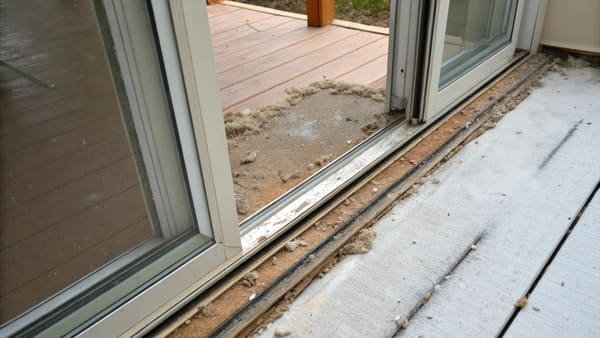
These are concerns that I address directly in our product design at opensliding. We work hard to manufacture systems that minimize these issues, but it’s important for any purchaser to be aware of them.
Maintenance and Cleaning
The track is the biggest potential headache. Over time, it can get clogged with dust, pet hair, and other debris. This can make the door hard to slide and feel gritty. Regular cleaning is a must to keep it operating smoothly. As a manufacturer, we’ve developed track systems5 with smoother profiles and better brush strips to help keep debris out, but it’s still a factor to consider, especially in high-traffic areas. I always tell my clients to account for this minor but regular upkeep.
Security and Sealing Concerns
A standard hinged door with a deadbolt provides excellent security. While you can get very secure locking systems for sliding doors, they operate differently and sometimes don’t feel as solid. The seal is another point. Because the door has to glide, there can be small gaps that affect soundproofing and energy efficiency. We combat this by producing high-quality rubber gaskets6 and brush strips that create a much tighter seal. But for a room that needs to be completely soundproof, a hinged door with proper weatherstripping usually performs better.
Which is better, sliding or normal doors?
You need to make the final call: the modern sliding door or the classic "normal" hinged door. This decision can define the feel of a space, so the pressure is on.
"Normal" (hinged) doors are best for standard bedrooms or offices where privacy and a tight seal are key. Sliding doors are the better choice for closets, patios, or dividing large open-plan areas where saving space and creating flow is more important.
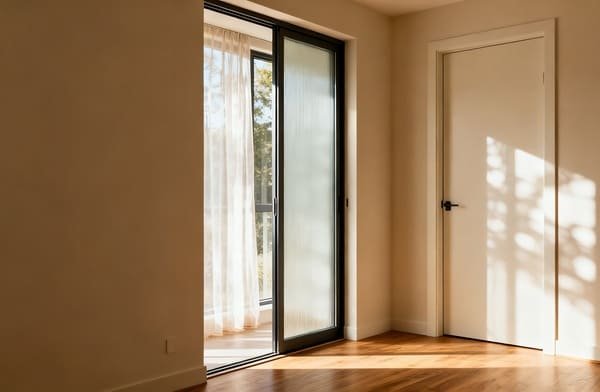
I always advise buyers to stop thinking about "better" in general terms and start thinking about "better for this specific room." The application is everything. The right door hardware solves a specific problem.
Choosing Based on Room Type
Let’s look at some examples. For a walk-in wardrobe, a sliding door is almost always the superior choice. It doesn’t swing out and block the hallway. For a front entrance, a hinged door offers the best security and weather sealing. For a pantry in a kitchen, a sliding barn door can work great because it saves space and adds a strong design element. It’s about matching the product to the purpose.
A Personal Story
I remember a contractor I work with who was building a series of small, modern apartments. His initial plan specified normal hinged doors7 for everything. I sat down with him and showed him how using our wardrobe sliding wheel systems8 would free up valuable floor space in the bedrooms. By removing the door’s swing arc, the rooms felt significantly larger and more open. He decided to make the switch. His client was thrilled with the final result, and it became a key selling point for the apartments.
Are hinged doors cheaper than sliding doors?
Every project has a budget, and the cost of doors and their hardware is a major line item. Choosing the more expensive option without a good reason can hurt your bottom line.
Generally, a basic hinged door with standard hardware is cheaper upfront than a basic sliding door system. A sliding door requires a track, rollers, and often more complex installation. However, high-end custom hinged doors can easily become more expensive than standard sliding systems.
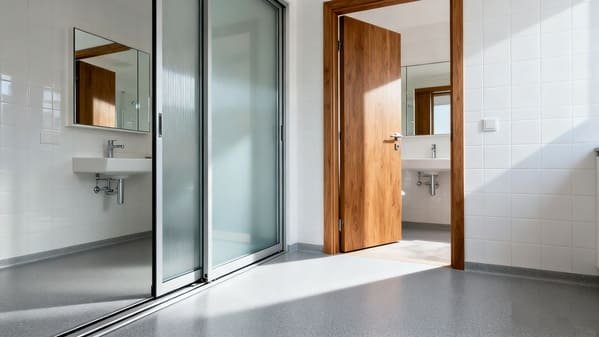
Cost is a frequent and important topic of conversation with my customers. A smart buyer like Jacky knows it’s not just about the unit price, but the total value.
Breaking Down the Costs
The total cost includes more than just the door panel.
- Hinged Door9: You need the door slab, 2-3 hinges, and a handle with a latch mechanism. The components are simple and widely available.
- Sliding Door10: You need the door slab, a top-hung or bottom-rolling track, a set of rollers, floor guides, and a handle or pull. The hardware system is more complex and engineered, which adds to the cost.
From our factory’s perspective, the production of a high-quality, smooth-rolling system involves more precision engineering than stamping out a simple hinge. This is reflected in the price.
Installation and Long-Term Value
Installation costs can also differ. Hanging a standard hinged door is a routine job for any carpenter. Installing a sliding door, especially a pocket door that disappears into the wall, is more labor-intensive and expensive. However, you have to consider the long-term value. The space saved by a sliding door can make a small home more livable or a commercial space more functional. That added value can often far outweigh the initial higher cost.
Conclusion
Hinged doors offer tradition and a secure seal, while sliding doors provide a modern, space-saving solution. The best choice always depends on your project’s specific needs for space, budget, and style.
Explore the advantages of sliding doors to enhance your living space and create a seamless flow between indoor and outdoor areas. ↩ ↩
Discover how hinged doors can provide privacy and style, making them ideal for bedrooms and bathrooms. ↩ ↩
Explore this link to understand how sliding doors can maximize your space effectively. ↩
Discover insights on insulation effectiveness between door types to make an informed choice. ↩
Explore this link to discover top-rated track systems that enhance the functionality and longevity of sliding doors. ↩
Learn how high-quality rubber gaskets can improve energy efficiency and soundproofing in your home. ↩
Discover the benefits of hinged doors, including security and weather sealing, to make informed choices for your home. ↩
Explore this link to understand how wardrobe sliding wheel systems can maximize space and enhance room design. ↩
Explore the advantages of Hinged Doors, including ease of installation and design flexibility, to make an informed choice for your space. ↩
Discover the benefits of Sliding Doors, such as space-saving features and aesthetic appeal, to enhance your home’s functionality. ↩

